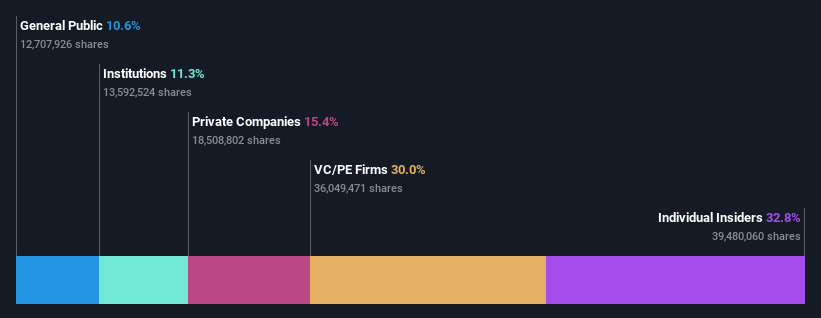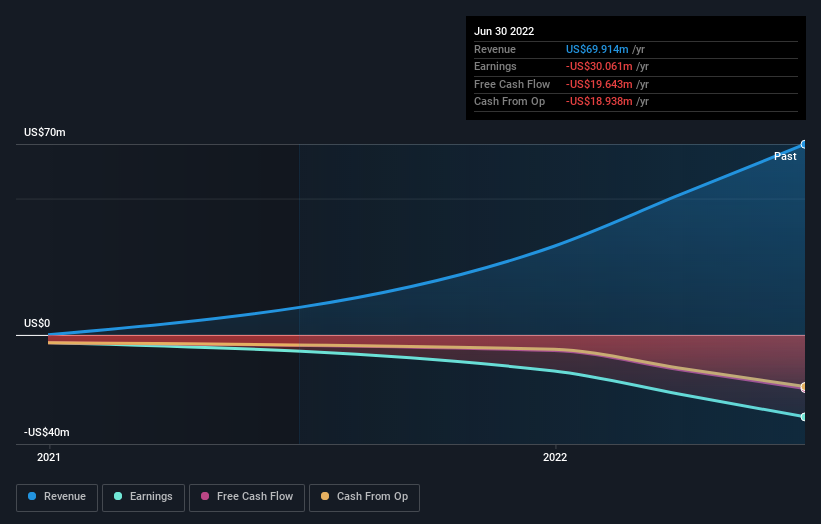- United States
- /
- IT
- /
- NasdaqCM:HUBC
HUB Cyber Security (Israel) Ltd. (NASDAQ:HUBC) insiders, who hold 33% of the firm would be disappointed by the recent pullback
Key Insights
- Significant insider control over HUB Cyber Security (Israel) implies vested interests in company growth
- 52% of the business is held by the top 5 shareholders
- Institutional ownership in HUB Cyber Security (Israel) is 11%
Every investor in HUB Cyber Security (Israel) Ltd. (NASDAQ:HUBC) should be aware of the most powerful shareholder groups. We can see that individual insiders own the lion's share in the company with 33% ownership. That is, the group stands to benefit the most if the stock rises (or lose the most if there is a downturn).
And last week, insiders endured the biggest losses as the stock fell by 11%.
Let's take a closer look to see what the different types of shareholders can tell us about HUB Cyber Security (Israel).
See our latest analysis for HUB Cyber Security (Israel)

What Does The Institutional Ownership Tell Us About HUB Cyber Security (Israel)?
Institutional investors commonly compare their own returns to the returns of a commonly followed index. So they generally do consider buying larger companies that are included in the relevant benchmark index.
As you can see, institutional investors have a fair amount of stake in HUB Cyber Security (Israel). This suggests some credibility amongst professional investors. But we can't rely on that fact alone since institutions make bad investments sometimes, just like everyone does. If multiple institutions change their view on a stock at the same time, you could see the share price drop fast. It's therefore worth looking at HUB Cyber Security (Israel)'s earnings history below. Of course, the future is what really matters.

We note that hedge funds don't have a meaningful investment in HUB Cyber Security (Israel). The company's largest shareholder is OurCrowd Ltd., with ownership of 14%. In comparison, the second and third largest shareholders hold about 11% and 10% of the stock.
On looking further, we found that 52% of the shares are owned by the top 5 shareholders. In other words, these shareholders have a meaningful say in the decisions of the company.
Researching institutional ownership is a good way to gauge and filter a stock's expected performance. The same can be achieved by studying analyst sentiments. As far as we can tell there isn't analyst coverage of the company, so it is probably flying under the radar.
Insider Ownership Of HUB Cyber Security (Israel)
The definition of company insiders can be subjective and does vary between jurisdictions. Our data reflects individual insiders, capturing board members at the very least. Management ultimately answers to the board. However, it is not uncommon for managers to be executive board members, especially if they are a founder or the CEO.
I generally consider insider ownership to be a good thing. However, on some occasions it makes it more difficult for other shareholders to hold the board accountable for decisions.
It seems insiders own a significant proportion of HUB Cyber Security (Israel) Ltd.. Insiders have a US$59m stake in this US$179m business. This may suggest that the founders still own a lot of shares. You can click here to see if they have been buying or selling.
General Public Ownership
With a 11% ownership, the general public, mostly comprising of individual investors, have some degree of sway over HUB Cyber Security (Israel). While this size of ownership may not be enough to sway a policy decision in their favour, they can still make a collective impact on company policies.
Private Equity Ownership
Private equity firms hold a 30% stake in HUB Cyber Security (Israel). This suggests they can be influential in key policy decisions. Some might like this, because private equity are sometimes activists who hold management accountable. But other times, private equity is selling out, having taking the company public.
Private Company Ownership
We can see that Private Companies own 15%, of the shares on issue. It might be worth looking deeper into this. If related parties, such as insiders, have an interest in one of these private companies, that should be disclosed in the annual report. Private companies may also have a strategic interest in the company.
Next Steps:
It's always worth thinking about the different groups who own shares in a company. But to understand HUB Cyber Security (Israel) better, we need to consider many other factors. For example, we've discovered 2 warning signs for HUB Cyber Security (Israel) that you should be aware of before investing here.
Of course this may not be the best stock to buy. Therefore, you may wish to see our free collection of interesting prospects boasting favorable financials.
NB: Figures in this article are calculated using data from the last twelve months, which refer to the 12-month period ending on the last date of the month the financial statement is dated. This may not be consistent with full year annual report figures.
Valuation is complex, but we're here to simplify it.
Discover if HUB Cyber Security might be undervalued or overvalued with our detailed analysis, featuring fair value estimates, potential risks, dividends, insider trades, and its financial condition.
Access Free AnalysisHave feedback on this article? Concerned about the content? Get in touch with us directly. Alternatively, email editorial-team (at) simplywallst.com.
This article by Simply Wall St is general in nature. We provide commentary based on historical data and analyst forecasts only using an unbiased methodology and our articles are not intended to be financial advice. It does not constitute a recommendation to buy or sell any stock, and does not take account of your objectives, or your financial situation. We aim to bring you long-term focused analysis driven by fundamental data. Note that our analysis may not factor in the latest price-sensitive company announcements or qualitative material. Simply Wall St has no position in any stocks mentioned.
About NasdaqCM:HUBC
HUB Cyber Security
Provides cyber security solutions in Israel, the Americas, and Europe.
Moderate risk and slightly overvalued.
Similar Companies
Market Insights
Community Narratives



